
Eugene Onegin, Op. 24, is an opera in 3 acts, composed by Pyotr Ilyich Tchaikovsky. The libretto, organised by the composer himself, very closely follows certain passages in Alexander Pushkin's 1825-1832 novel in verse, retaining much of his poetry. Tchaikovsky's friend Konstantin Shilovsky contributed M. Triquet's verses in Act 2, Scene 1, while Tchaikovsky himself arranged the text for Lensky's arioso in Act 1, Scene 1, and almost all of Prince Gremin's aria in Act 3, Scene 1.

Russian ballet is a form of ballet characteristic of or originating from Russia.
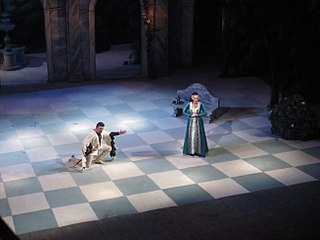
Iolanta, Op. 69, is a lyric opera in one act by Pyotr Tchaikovsky. It was the last opera he composed. The libretto was written by the composer's brother Modest Tchaikovsky, and is based on the Danish play Kong Renés Datter by Henrik Hertz, a romanticised account of the life of Yolande de Bar. In the original Danish play, the spelling of the princess's name was "Iolanthe", later adopted for the otherwise unrelated Gilbert and Sullivan operetta of that name. The play was translated by Fyodor Miller and adapted by Vladimir Zotov. The opera received its premiere on 18 December 1892 in Saint Petersburg.
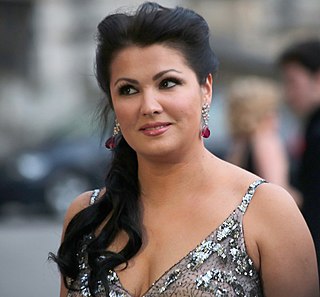
Anna Yuryevna Netrebko is a Russian-Austrian operatic soprano with an active international career who has performed prominently at the Salzburg Festival, Metropolitan Opera, Vienna State Opera, and The Royal Opera.

People's Artist of the Russian Federation, also sometimes translated as National Artist of the Russian Federation, is an honorary and the highest title awarded to citizens of the Russian Federation, all outstanding in the performing arts, whose merits are exceptional in the sphere of the development of the performing arts.
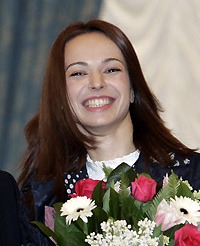
Diana Viktorovna Vishneva is a Russian ballet dancer who performs as a principal dancer with the Mariinsky Ballet.

Arena di Verona Festival is a summer festival of opera, located in the city of Verona, Italy. Since 1936, it has been organized under the auspices of an official body, first the Ente Autonomo Spettacoli Lirici Arena di Verona,, and then, following legislation in 1996 and 1998, the Ente Lirico Arena di Verona was transformed into a private foundation, the present-day Arena di Verona Foundation.
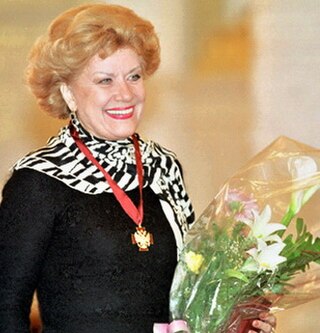
Elena Vasiliyevna Obraztsova was a Soviet and Russian mezzo-soprano. She was awarded the People's Artist of the USSR in 1976 and Hero of Socialist Labour in 1990.

The Moscow Orphanage or Foundling Home was an ambitious project conceived by Catherine the Great and Ivan Betskoy, in the early 1760s. This idealistic experiment of the Age of Enlightenment was intended to manufacture "ideal citizens" for the Russian state by bringing up thousands of abandoned children to a very high standard of refinement, cultivation, and professional qualifications. Despite more than adequate staffing and financing, the Orphanage was plagued by high infant mortality and ultimately failed as a social institution.
Metropolitan Opera Live in HD is a series of live opera performances transmitted in high-definition video via satellite from the Metropolitan Opera in New York City to select venues, primarily movie theaters, in the United States and other parts of the world. The first transmission was of a condensed English-language version of Mozart's The Magic Flute on December 30, 2006. Many of the video recordings are later rebroadcast via public television as part of the Great Performances at the Met series, and most are made available for streaming at Met Opera on Demand.

Dmitri Aleksandrovich Hvorostovsky was a Russian operatic baritone.

Constantine Garrievich Orbelian, Jr. is an American conductor and pianist of Armenian and Russian descent. He is named after his paternal uncle Konstantin Orbelyan, a major Armenian composer. Constantine Orbelian is currently Music Director and Principal Conductor of the New York City Opera.

Marina Poplavskaya is a Russian operatic soprano. Her repertoire includes leading roles in operas of the Romantic era; she is particularly known for her performances in the operas of Verdi.

Teodor Currentzis is a Greek-Russian conductor, musician and actor.
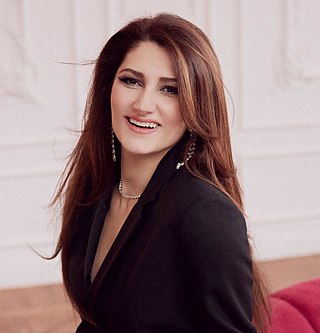
Dinara Alieva is an Azerbaijani and Russian opera singer (soprano). She is currently a soloist at the State Academic Bolshoi Theatre of Russia, where she made her debut in 2009 as Liù in Puccini's opera Turandot. People's Artist of Azerbaijan (2018).

Ildar Amirovich Abdrazakov is a Russian bass opera singer. Honoured Artist of Russia (2021).
Irina Lungu is a Russian operatic soprano.
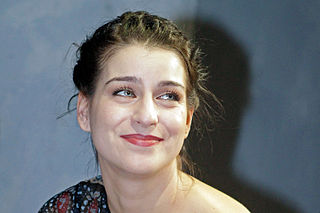
Asmik Grigorian is a Lithuanian operatic soprano.
Dina Kuznetsova is an American lyric dramatic operatic soprano of Russian descent who has appeared in leading roles on the stages of international opera houses from New York to Sydney. She has focused on Italian and Slavic repertoires. Her signature roles include Tatyana in Tchaikovsky's Eugene Onegin, Desdemona in Verdi's Otello, Cio-Cio San in Madama Butterfly by Puccini, the title role in Dvořák's Rusalka, and Kátya in Kátya Kabanová by Janáček.















